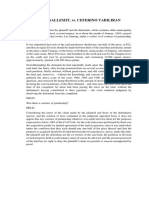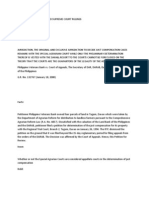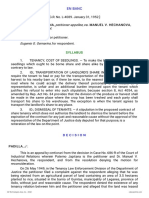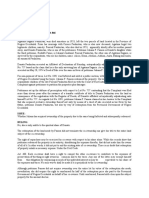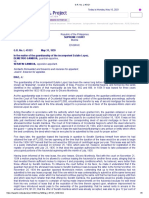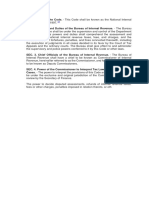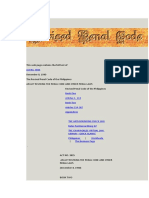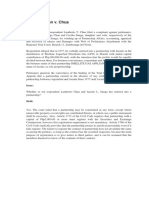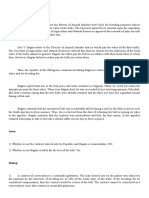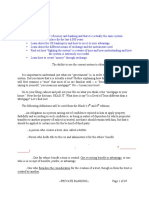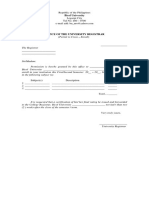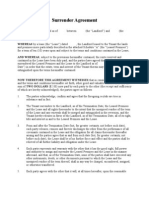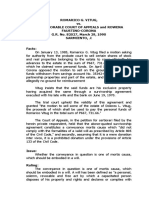G 5
G 5
Uploaded by
jeljeljelejel arnettarnettCopyright:
Available Formats
G 5
G 5
Uploaded by
jeljeljelejel arnettarnettOriginal Title
Copyright
Available Formats
Share this document
Did you find this document useful?
Is this content inappropriate?
Copyright:
Available Formats
G 5
G 5
Uploaded by
jeljeljelejel arnettarnettCopyright:
Available Formats
G.R. No.
5837 September 15, 1911
CATALINO GALLEMIT, vs. CEFERINO TABILIRAN
FACTS:
Plaintiff he alleged that the plaintiff and the defendant, while residents ofthe municipality
of Dapitan, had acquired, in joint tenancy, in or about the month of January, 1904, a parcel
of land from its original owner, Lui Ganong, under a verbal, civil contract of partnership,
for the price of P44.
It was stipulated that each of the said purchasers should pay one-half of the price, or P22,
and that an equal division should be made between them of the land thus purchased, situate
in the place called Tangian, of the barrio of Dohinob, municipality of Dapitan, sub-district
of the same name, Moro Province, and bounded on the north and east by the Tangian river,
on the south and west by government forests, and containing 19.968 square meters,
approximately, planted with 200 abaca plants.
Notwithstanding the demands he had repeatedly made upon the defendant to divide the
said land, the latter, after having promised him on several occasions that he would make
such partition, finally refused, without good reason, and still continued to refuse to divide
the land and, moreover, - without the knowledge and consent of the plaintiff, defendant
gathered the abaca crops of the years 1904, 1905 and 1906, produced on the land in
question, and extracted the hemp therefrom in the amount of about 1a2rrobas to each crop,
he being the sole beneficiary of the fiber obtained, - and, that since the year 1904, up to the
time of the complaint, he alone had been paying the taxes on the land, without the
defendant's having contributed to their payment. - the court rendered judgment by
absolving the defendant from the complaint.
ISSUE:
Was there a contract of partnership?
HELD:
Considering the terms of the claim made by the plaintiff and those of the defendant's
answer, and the relation of facts contained in the judgment appealed from, it does not
appear that any contract of partnership whatever was made between them for the purposes
expressed in article 1665 of the Civil Code, for the sole transaction performed by them was
the acquisition jointly by mutual agreement of the land in question, since it was undivided,
under the condition that they each should pay one-half of the price thereof and that the
property so acquired should be divided between the two purchasers; and as, under this title,
the plaintiff and the defendant are the co-owners of the said land, the partition or division
of such property held in joint tenancy must of course be allowed, and the present possessor
of the land has no right to deny the plaintiff's claim on grounds or reasons unsupported by
proof.
You might also like
- Certificate of Analysis: Please Contact Your 3M Customer Service Representative If You Have Any QuestionsDocument2 pagesCertificate of Analysis: Please Contact Your 3M Customer Service Representative If You Have Any QuestionsSergioNo ratings yet
- Rob Judge & Bobby Rio 99 Best-Texts (2013)Document5 pagesRob Judge & Bobby Rio 99 Best-Texts (2013)L Yovani GarciaNo ratings yet
- Turkish Contract Law - İlhan HelvacıDocument305 pagesTurkish Contract Law - İlhan HelvacıNope NoopeNo ratings yet
- 5837 Gallemit V TabiliranDocument2 pages5837 Gallemit V Tabiliranceilo coboNo ratings yet
- Gallemit Vs TabilaranDocument3 pagesGallemit Vs Tabilarangilbert213100% (3)
- Affidavit On The Recovery of Lost Title: Romarico Sotto Santos Affiant SUBSCRIBED AND SWORN To Before Me On 17Document2 pagesAffidavit On The Recovery of Lost Title: Romarico Sotto Santos Affiant SUBSCRIBED AND SWORN To Before Me On 17Kristianne Sipin100% (1)
- Sworn Statement SampleDocument2 pagesSworn Statement SampleRebecca Chan100% (6)
- Catalino Gallemit, vs. Ceferino Tabiliran: FactsDocument1 pageCatalino Gallemit, vs. Ceferino Tabiliran: Factsjeljeljelejel arnettarnettNo ratings yet
- G.R. No. 5837 September 15, 1911 Catalino GALLEMIT, Plaintiff-Appellant, CEFERINO TABILIRAN, Defendant-AppelleeDocument1 pageG.R. No. 5837 September 15, 1911 Catalino GALLEMIT, Plaintiff-Appellant, CEFERINO TABILIRAN, Defendant-AppelleeLorelieNo ratings yet
- 27 Gallemit vs. TabilaranDocument7 pages27 Gallemit vs. TabilaranYaz CarlomanNo ratings yet
- Carag V Ca (Agra)Document2 pagesCarag V Ca (Agra)seentherellaaaNo ratings yet
- Partnership CasesDocument113 pagesPartnership CasessepaquidaoNo ratings yet
- Barretto Vs BarrettoDocument2 pagesBarretto Vs BarrettoBibi JumpolNo ratings yet
- Disposition Under PLA and Other Laws Case DigestDocument8 pagesDisposition Under PLA and Other Laws Case DigestptbattungNo ratings yet
- Kasilag vs. Rodriguez 2Document27 pagesKasilag vs. Rodriguez 2Anonymous vAVKlB1No ratings yet
- Disposition Under PLA and Other Laws Case DigestDocument38 pagesDisposition Under PLA and Other Laws Case DigestptbattungNo ratings yet
- 7 - SC - Batas.org - 1919 - G.R. No. 13505, February 04, 1919Document14 pages7 - SC - Batas.org - 1919 - G.R. No. 13505, February 04, 1919MarieNo ratings yet
- Barretto v. BarrettoDocument12 pagesBarretto v. BarrettoAlexaNo ratings yet
- Agrarian Cases - Bernas To HilarioDocument36 pagesAgrarian Cases - Bernas To HilariojelyneptNo ratings yet
- Void or Inexistent Contracts - DBP v. CA - (1995)Document1 pageVoid or Inexistent Contracts - DBP v. CA - (1995)Lino MomonganNo ratings yet
- Olegario B Clarin VS Alberto L. RulonaDocument5 pagesOlegario B Clarin VS Alberto L. RulonaMarjo PachecoNo ratings yet
- Case Digest GABRIEL v. PANGILINANDocument3 pagesCase Digest GABRIEL v. PANGILINANAbeguel SebandalNo ratings yet
- Bernas Vs CADocument41 pagesBernas Vs CARatani UnfriendlyNo ratings yet
- Property CasesDocument7 pagesProperty CasesJacinto Jr JameroNo ratings yet
- Supreme Court: Guevara, Francisco and Recto For Appellant. Mendoza and Clemeña For AppelleeDocument5 pagesSupreme Court: Guevara, Francisco and Recto For Appellant. Mendoza and Clemeña For AppelleeIris Jianne MataNo ratings yet
- C. C. Cohn and Thos. D. Aitken For Appellant. Crossfield & O'Brien For AppelleeDocument10 pagesC. C. Cohn and Thos. D. Aitken For Appellant. Crossfield & O'Brien For AppelleeVeraNataaNo ratings yet
- Republic of The PhilippinesDocument52 pagesRepublic of The PhilippinesJeffreyReyesNo ratings yet
- Agne v. Director of Lands 2Document2 pagesAgne v. Director of Lands 2Reycy Ruth TrivinoNo ratings yet
- Republic vs. Alconaba FactsDocument4 pagesRepublic vs. Alconaba FactsCalagui Tejano Glenda JaygeeNo ratings yet
- Philippine National Railways Case DigestDocument2 pagesPhilippine National Railways Case DigestRoxanne Jed ValenteNo ratings yet
- Daywalt v. La Corporacion de Los Padres AgustinosDocument10 pagesDaywalt v. La Corporacion de Los Padres AgustinosConacon ESNo ratings yet
- LTD Questions 9 - OABELDocument6 pagesLTD Questions 9 - OABELoabeljeanmoniqueNo ratings yet
- Digest of Agrarian From DAR WebsiteDocument260 pagesDigest of Agrarian From DAR WebsiteEdlyn Favorito Romero100% (1)
- Kasilag Vs Rodriguez (PFR)Document2 pagesKasilag Vs Rodriguez (PFR)Ronnel B. FilioNo ratings yet
- G.R. No. L-4089 - Japitana v. Hechanova PDFDocument3 pagesG.R. No. L-4089 - Japitana v. Hechanova PDFMarco BrimonNo ratings yet
- Agra LawDocument3 pagesAgra LawJillian Jen Tanedo DoteNo ratings yet
- Fabie Vs David GR No. L-123Document5 pagesFabie Vs David GR No. L-123Yen Yen NicolasNo ratings yet
- Midterm Case Agrarian Law Gabriel Vs PangilinanDocument9 pagesMidterm Case Agrarian Law Gabriel Vs PangilinanGC SportsNewsNo ratings yet
- Oblicon Digests 2 (New Edit)Document44 pagesOblicon Digests 2 (New Edit)DanielleNo ratings yet
- Addison V Felix 38 Phil. 404, Augsust 3, 1918Document2 pagesAddison V Felix 38 Phil. 404, Augsust 3, 1918Armand Jerome CaradaNo ratings yet
- GR 137509 Felizardo V FernandezDocument7 pagesGR 137509 Felizardo V FernandezleojobmilNo ratings yet
- Bernardo vs. BataclanDocument3 pagesBernardo vs. BataclanRhea CalabinesNo ratings yet
- Case Digest PossessionDocument3 pagesCase Digest PossessionIamIvy Donna PondocNo ratings yet
- Paleyo v. Lauron PDFDocument5 pagesPaleyo v. Lauron PDFRachelle CasimiroNo ratings yet
- Assign5 Mahinay, Beya AmmahryDocument22 pagesAssign5 Mahinay, Beya AmmahryAmmahry BeyNo ratings yet
- Olino Vs Medina G.R. No. 4952 - March 29, 1909Document10 pagesOlino Vs Medina G.R. No. 4952 - March 29, 1909Atheena MondidoNo ratings yet
- G.R. No. L-45121Document5 pagesG.R. No. L-45121Scrib LawNo ratings yet
- September 30 Property 1Document52 pagesSeptember 30 Property 1Shanell EscalonaNo ratings yet
- Azarcon vs. Vallarta G.R. No. L-43679, October 28, 1980Document2 pagesAzarcon vs. Vallarta G.R. No. L-43679, October 28, 1980reyna amor condesNo ratings yet
- September 30 Property 1Document52 pagesSeptember 30 Property 1Shanell EscalonaNo ratings yet
- Henry Mon Vs CADocument13 pagesHenry Mon Vs CAKharol EdeaNo ratings yet
- Credit Case DigestDocument20 pagesCredit Case DigestMhayBinuyaJuanzon100% (1)
- Kasilag vs. RodriguezDocument3 pagesKasilag vs. Rodriguezbb yattyNo ratings yet
- LTD Digest Pool 5pdf PDFDocument13 pagesLTD Digest Pool 5pdf PDFColeenNo ratings yet
- Agricultural TenancyDocument16 pagesAgricultural TenancyRJ BanquerigoNo ratings yet
- GR No. L-13299 ADRID vs. MORGADocument1 pageGR No. L-13299 ADRID vs. MORGACelver Joy Gaviola TampariaNo ratings yet
- 3) Bernardo Vs Bataclan DigestDocument3 pages3) Bernardo Vs Bataclan DigesthectorjrNo ratings yet
- Confirmation of Title Over Land Previously Declared Public LandDocument20 pagesConfirmation of Title Over Land Previously Declared Public LandRolly AcunaNo ratings yet
- Oblicon Digests 2 (Partial Edit)Document67 pagesOblicon Digests 2 (Partial Edit)Diane UyNo ratings yet
- SalesDocument7 pagesSalesLyka Dennese SalazarNo ratings yet
- Bachrach Motor Co. vs. Talisay-Silay Milling CoDocument17 pagesBachrach Motor Co. vs. Talisay-Silay Milling CoNiki Dela CruzNo ratings yet
- Antichresis DigestsDocument11 pagesAntichresis Digestsus madamba100% (1)
- CASE No. 75 Bienvenido T. Buada vs. Cement Center IncDocument2 pagesCASE No. 75 Bienvenido T. Buada vs. Cement Center IncJonel L. SembranaNo ratings yet
- LOT 1: A LEGAL DECRIPTION OF JUDICIAL CORRUPTION IN COOK COUNTY, ILLINOIS COOK COUNTY PARCEL NUMBERS ARE NOT LOT NUMBERSFrom EverandLOT 1: A LEGAL DECRIPTION OF JUDICIAL CORRUPTION IN COOK COUNTY, ILLINOIS COOK COUNTY PARCEL NUMBERS ARE NOT LOT NUMBERSNo ratings yet
- SEC. 1. Title of The CodeDocument1 pageSEC. 1. Title of The Codejeljeljelejel arnettarnettNo ratings yet
- Act No. 3815Document2 pagesAct No. 3815jeljeljelejel arnettarnettNo ratings yet
- G 15Document1 pageG 15jeljeljelejel arnettarnettNo ratings yet
- Turn It UpDocument1 pageTurn It Upjeljeljelejel arnettarnettNo ratings yet
- Sunga - Chan v. Chua: FactsDocument1 pageSunga - Chan v. Chua: Factsjeljeljelejel arnettarnettNo ratings yet
- Taboada V Rosal: Rating: 5 - 1 VoteDocument1 pageTaboada V Rosal: Rating: 5 - 1 Votejeljeljelejel arnettarnettNo ratings yet
- Carolyn M. Garcia vs. Rica Marie S. Thio G.R. No. 154878, March 16, 2007 FactsDocument7 pagesCarolyn M. Garcia vs. Rica Marie S. Thio G.R. No. 154878, March 16, 2007 Factsjeljeljelejel arnettarnettNo ratings yet
- G.R. No. 184148 June 9, 2014 Nora B. Calalang-Parulan and Elvira B. Calalang, Petitioners, Rosario Calalang-Garcia, Leonora Calalang-Sabile, and Carlito S. CALALANG, RespondentsDocument5 pagesG.R. No. 184148 June 9, 2014 Nora B. Calalang-Parulan and Elvira B. Calalang, Petitioners, Rosario Calalang-Garcia, Leonora Calalang-Sabile, and Carlito S. CALALANG, Respondentsjeljeljelejel arnettarnettNo ratings yet
- Bejar V CaluagDocument9 pagesBejar V Caluagjeljeljelejel arnettarnett100% (1)
- Land Tittles and Deeds ReportDocument4 pagesLand Tittles and Deeds Reportjeljeljelejel arnettarnettNo ratings yet
- 02 Republic Vs BagtasDocument2 pages02 Republic Vs BagtasDean BenNo ratings yet
- Dee vs. Harvest ALl Investment - 2017Document2 pagesDee vs. Harvest ALl Investment - 2017Dyords Tiglao100% (2)
- GENEVIEVE LIM, Petitioner, vs. FLORENCIO SABAN, RespondentsDocument2 pagesGENEVIEVE LIM, Petitioner, vs. FLORENCIO SABAN, RespondentsJames WilliamNo ratings yet
- 47 CMS Logging v. CADocument2 pages47 CMS Logging v. CAAnthony ChoiNo ratings yet
- Tesla V CaoDocument14 pagesTesla V CaoGizmodo EditNo ratings yet
- Surrender of Withhold Duplicate CertificatesDocument1 pageSurrender of Withhold Duplicate CertificatesEsmeralda De GuzmanNo ratings yet
- Francia Vs Intermediate Appellate Court GR No L-67649Document4 pagesFrancia Vs Intermediate Appellate Court GR No L-67649Ren Magallon100% (1)
- Fruit of The Loom Vs CADocument3 pagesFruit of The Loom Vs CAChristineNo ratings yet
- Landscape Maintenance AgreementDocument2 pagesLandscape Maintenance Agreementlilia_j0% (1)
- Private BankingDocument49 pagesPrivate Bankingcamwills2100% (16)
- Republic of The Philippines Legazpi City Tel No: 480 - 0700: Bicol UniversityDocument2 pagesRepublic of The Philippines Legazpi City Tel No: 480 - 0700: Bicol Universitytoyi kamiNo ratings yet
- Child Power of AttorneyDocument2 pagesChild Power of AttorneylegalNo ratings yet
- Heirs of Cipriano Trazona Vs Heirs of CanadaDocument2 pagesHeirs of Cipriano Trazona Vs Heirs of CanadaflorNo ratings yet
- Adjudication Order Against Complex Trading Company Limited in The Matter of SCORESDocument6 pagesAdjudication Order Against Complex Trading Company Limited in The Matter of SCORESShyam SunderNo ratings yet
- Distribution of Intestate EstateDocument4 pagesDistribution of Intestate EstateSAMANTHA VILLANUEVA MAKAYANNo ratings yet
- சென்னை தினத்தந்தி 24-8-23Document14 pagesசென்னை தினத்தந்தி 24-8-23Atthippattu Srinivasan MuralitharanNo ratings yet
- ESSO STANDARD MALAYA BHD V SOUTHERN CROSSDocument7 pagesESSO STANDARD MALAYA BHD V SOUTHERN CROSSizzq_dfcNo ratings yet
- Fortune Motors Corp. vs. CADocument11 pagesFortune Motors Corp. vs. CAStefan SalvatorNo ratings yet
- Rahul Vs Manju Rani HMA Replication KKDDocument8 pagesRahul Vs Manju Rani HMA Replication KKDketan kumarNo ratings yet
- APEX CLEAN ENERGY: Heritage Wind - Violations of Code of ConductDocument14 pagesAPEX CLEAN ENERGY: Heritage Wind - Violations of Code of ConductpandorasboxofrocksNo ratings yet
- Surrender of LeaseDocument3 pagesSurrender of LeaseLegal Forms83% (6)
- Code of EthicsDocument3 pagesCode of EthicsElla Ocampo ReyesNo ratings yet
- G.R. No. 82027Document2 pagesG.R. No. 82027CAJNo ratings yet
- Pds Rev 2005Document4 pagesPds Rev 2005Bryan AnbryNo ratings yet
- WaiverrrDocument3 pagesWaiverrrchromayueNo ratings yet







